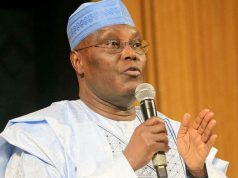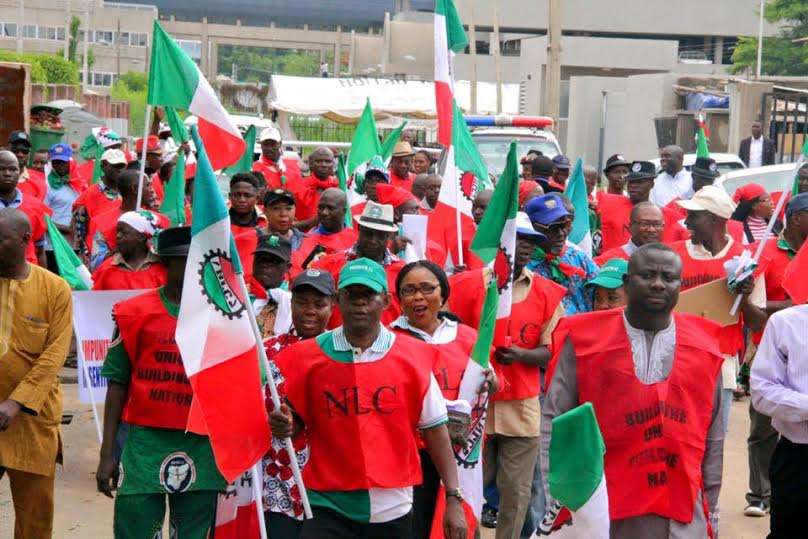For the umpteenth times, the Nigerian workers, led by the Nigeria Labour Congress (NLC) and the Trade Union Congress (TUC) began another nationwide strike today, Thursday, September 27, 2018. The seven-day warning strike is coming on the heels of what was said to be failure by the government of President Muhammadu Buhari to reach definitive date for the implementation of the new minimum wage of N56,000 for those in public service, both at federal and state levels as well as even those in private sector.
The existing minimum wage across board is N18,000, which of course, many state governments have been at great pain, either by accident or by design, to pay, leading to several months accumulation.
The agitation for the new minimum wage started on April 26, 2016, when the NLC submitted a proposal to the barely one year old Muhammadu Buhari’s federal government, though the unions admitted the economy was not doing well, but that the law stated that wages for workers must be reviewed after every five years.
The NLC had recalled that the last review of the national minimum wage was done in 2011 and that the setting up of a tripartite committee to review the newly proposed national minimum wage was long overdue.
The NLC President, Ayuba Wabbah then argued that the logic behind the new minimum wage was to ensure that no worker earned below what can sustain him or her for a period of 30 days, saying: “you also know that when we negotiated the N18, 000 minimum wage, the value in terms of exchange rate at that time was almost at N110 to the dollar.
“But as at today, the value of the naira to the dollar has been reduced; and there are the issues of inflation and purchasing power, among others to contend with. So, it is also about the law of the review of the wage; the law envisaged that within a circle of five years, there must be a review.”
Of course, the government subsequently reached a consensus with the labour unions to up the minimum wage to N56, 000. That was after a Presidential Technical Committee on Palliative had held series of meetings with the unions.
After the submission of the technical committee report, the President set up a tripartite committee, involving the government, private and public sectors to look into the report.
The labour unions became worried when the government seemed dragging foot on the matter, even though, the government had promised to implement the minimum wage in November this year.
The delay appears to be the only issue that had led to the strike action by the workers, which started today.
The union leaders are right to argue on matter of principle and maybe constitution, written or otherwise, that minimum wage should be reviewed at every regular intervals against the background of the economic performances and price movements, but the main point that the unions may be missing is the issue of the capacity or the willingness on the part of the government, especially at the state level, to pay.
The labour unions seemed to have been cut between mouth-watering minimum wage which they are pursuing with some kind of strength and righteousness, and blatant refusal by many state governments to pay even the ‘small’ amount that was agreed on since 2011. As a matter of fact, the union leaders have never been found to be more biting on state governments that have failed to pay the N18,000 to their workers for, in most case 12 to 15 months as they appear to be doing when demanding for increase in the wage.
The union leaders, who are out with club in hands, demanding over 150 percent above the N18,000 existing minimum wage should be seen and recognized as fighting for what looks an end in itself: a fight, though legitimate, for emptiness.
In other words, we at Greenbarge Reporters find it difficult to correlate the agitation for N56,000 minimum wage against the background of accumulated arrears, in billions of naira which many state governments have refused, with impunity, to pay their workers and for which the same union leaders seem weak to ‘force’ the state governments involved to pay.
If it is argued that state governments and to some extent, many private sectors cannot pay the N18,000 that has been existing since 2011, what informs the union leaders that the same state governments and private sectors will pay the N56,000? Or are the union leaders just out demanding the new minimum wage as a way of fulfilling their leadership obligation to the workers, without taking into consideration the reality on the ground?
Which should the union leaders agitate for more: up-to-date payment of the accumulated wages of workers in many states of the federation or more money as salary that will continue to accumulate too? If the state governments or private sectors genuinely don’t have the money to pay the N56,000, what will happen?
All said, do the Nigerian workers not deserve more than they are getting from the system they are serving diligently? We, at the Greenbarge Reporters think they do, both in terms of increment even above N56,000 in their take-home pay, and more importantly, in terms of prompt payment of their dues.
Doing so is Godly and not doing so, whatever name it is called, is unGodly.





